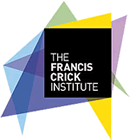This 4-year PhD studentship is offered in Dr Richard Treisman’s Group based at the Francis Crick Institute (the Crick).
Our laboratory studies a novel family of signal-responsive transcription factors, the MRTFs, and their upstream signalling pathway, the Rho-actin pathway. The MRTFs allow the gene transcription to be coordinated with alterations in the dynamics of the actin cytoskeleton induced by extracellular chemical or mechanical cues.
The MRTFs bind unpolymerised actin (G-actin) through a short sequence, the RPEL motif, that defines the RPEL protein family. RPEL proteins play direct and indirect roles in the control of cytoskeletal behaviour and biological processes dependent on it, such as cell morphology and adhesion, and cancer invasion and metastasis. Our current model is that G-actin regulates MRTFs and other RPEL proteins by controlling their interactions with regulatory and effector proteins.
The project areas available include:
(i) The two MRTFs are transcriptional coactivators for the SRF transcription factor. Their nuclear accumulation is controlled by G-actin[1, 2]. The MRTFs control hundreds of genes, many of which build or regulate the actin cytoskeleton, and as a result, MRTF-null cells exhibit adhesion, motility and metastasis defects [3]. G-actin also controls MRTF activity in the nucleus, and we are using genomic and biochemical approaches to investigate two aspects of this: control of the access of MRTFs to DNA, and control productive transcription by RNA PolII. We are also developing methods to visualise where in the cell G-actin/RPEL protein interactions occur and how these interactions change in response to external signalling. We will use these to study the dynamics of MRTF activation in different cellular and regulatory contexts such as the cell cycle and mechanical stress.
(ii) The MRTF-SRF pathway is activated under conditions of mechanical stress, such as the increased tissue stiffening which accompanies cancer progression and fibrosis. We are interested in the mechanisms by which pathway activation is sensitised to mechanical stress in a cell specific manner, and the relation between MRTF-SRF signalling and another mechansensitive pathway, the YAP-TEAD pathway [4, 5] .
(iii) We also work on two other RPEL protein families, the four Phactrs - regulatory subunits of the PP1 phosphatase - and the ArhGAP12 family of Rho GTPase activating proteins [6, 7]. We use cell biological and mouse model approaches to study how these proteins control cytoskeletal events, and to understand the functional significance of the coupling of the activity to actin dynamics.
Projects utilise a wide variety of experimental approaches including molecular cell biology, functional genomics and global analysis of gene expression, siRNA screening, biochemical and structural studies, and mouse models. The precise project pursued for PhD will be decided on in consultation with RT.
Talented and motivated students passionate about doing research are invited to apply for this PhD position. The successful applicant will join the Crick PhD Programme in September 2021 and will register for their PhD at one of the Crick partner universities (Imperial College London, King’s College London or UCL).
Applicants should hold or expect to gain a first/upper second-class honours degree or equivalent in a relevant subject and have appropriate research experience as part of, or outside of, a university degree course and/or a Masters degree in a relevant subject.
APPLICATIONS MUST BE MADE ONLINE VIA OUR WEBSITE (ACCESSIBLE VIA THE ‘APPLY NOW’ LINK ABOVE) BY 12:00 (NOON) 23 March 2021. APPLICATIONS WILL NOT BE ACCEPTED IN ANY OTHER FORMAT.

 Continue with Facebook
Continue with Facebook



